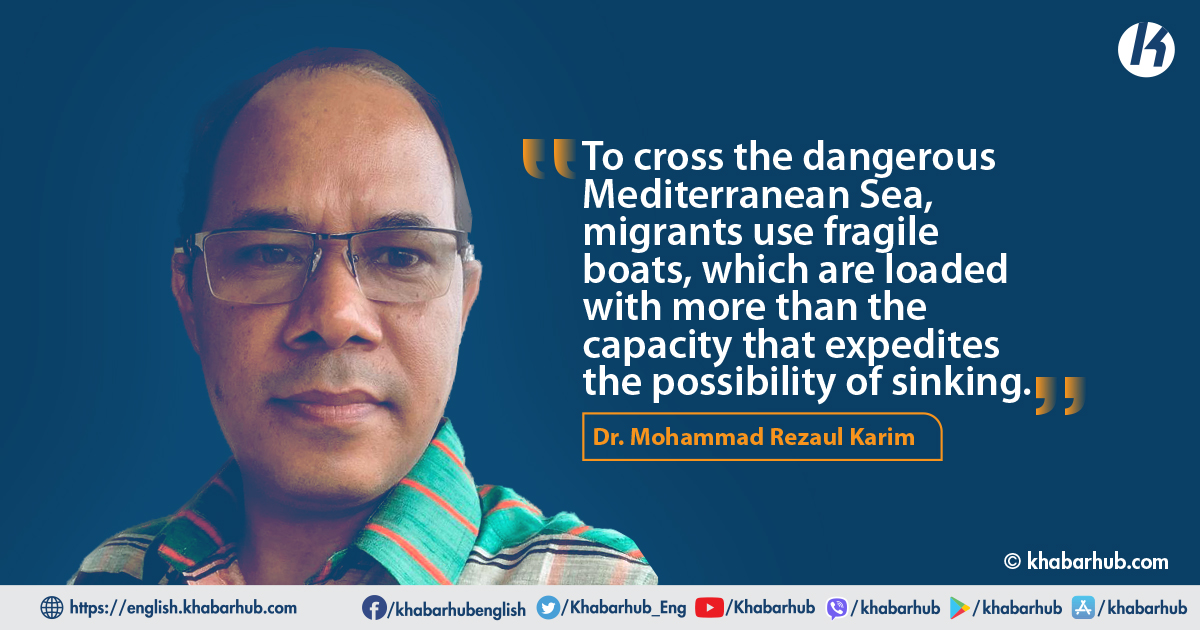Tunisian authorities rescued 105 irregular migrants on 22 August 2021 after the migrants carrying boats sank off on the country’s coast in the Mediterranean Sea.
This is one of many cases that frequently occurs in this area triggering a significant number of death cases over the years.
For years, people from developing or LDCs useMaghreb countries (Algeria, Libya, Mauritania, Morocco and Tunisia) to reach Europe mainly to Italy, Greece, Spain, Cyprus, and Malta with the hope of better life and livelihood. Italy is the first choice of these illegally migrated people.
To cross the dangerous Mediterranean Sea, migrants use fragile boats, which are loaded with more than the capacity that expedites the possibility of sinking.
And it happens. When boats capsize, the hope of better life sinks causing deaths and causalities. Further, suffering from survival beings with the scarcity of food, the severity of adverse weather conditions, illegal issue of arrival, and so on.
From 2014 to 2021 (till December), a total of 22,90,108 people from Asia and Africa arrived in Europe and 22139 migrants died.
The exact number for both cases is believed much higher than the estimation. Although men are in higher number, women and children are also significant.
The Mediterranean is termed as the deadliest place for migrants as its share equals more than 50% of death cases of migrants in 2019. Although it is declining from 63.70% in 2016 to 51.70% in 2019 is still a big number.
We can reiterate the words of IOM Libya Chief Mission and reinforce that ‘the mounting loss of life in the Mediterranean is a manifestation of the inability of States to take decisive action to redeploy much needed, dedicated search and rescue capacity in the deadliest sea-crossing in the world for the betterment of migrants and the world as well.
The most common nationalities of Mediterranean sea and land arrivals from January 2021 are Tunisia (24.70%), Bangladesh (11.10%), Egypt (10.80%), Syria (6.20%), Iran (5.80%), Cote d’Ivoire (5.60%), Iraq (4.30%), Guinea (3.40%), Eritrea (3.30) and others (3.20%).
The question is why people travel this dangerous route risking their lives and what are possible suggestions to stop or minimize the casualties and deaths in the Med.
The push-pull factors of a better life in the Europe and opposite in their own countries mainly serve for this huge migration.
Political instability, unemployment problem, corruption & illegal aspects of travel agencies, social insecurity of home countries; human resource demand of developed nations, social stability and attraction of European countries are the prime issues of this illegal exodus.
Apart from these issues, obliviousness to the Mediterranean crisis and the greed of migrants are also the causes of this migration.
Most importantly, men, women and children traveling in irregular manner are believed to either be forced from their homes by armed conflict or persecution, or social insecurity of their country.
Illegal migration that reaches 84 million until mid-2021 brings critical and multiple problems including statelessness of 4.3 million and the rate for both cases is increasing.
Migrants who survive not only encounter severe difficulties on the way to reach Europe but also face troubles after their arrival.
Since they are illegally transferred, they are detained in overcrowded centers; encounter widespread arbitrary arrests and imprisonment and extortion and abuse.
Host countries face problems of integration as this group comes from diverse cultural orientations. About 25 million persons born in a third country are believed living in the EU representing 5% of its total population. It demands special interventions and strategies to mainstream them to build a cohesive society.
It is opined that uneven development of the world and global inequality negatively impact and force to search illegal ways of migrating to the livable country.
If developing countries and LDCs are not helped much to become a developed or developing nation with an enhanced standard of living, it would not be solved anyway.
Whatever the reason is, the fact is that number of death cases is increasing. It is a concern for both the originating and host countries. Moreover, it is not a bilateral issue rather it is a multilateral and global concern.
Apart from the responsibility-sharing by the EU, for a sustainable solution to this crisis, a comprehensive plan of action must be designed with the EU, Maghreb countries and the originating countries in order to stop, rescue and repatriate to save valuable lives.
Additionally, continuous restrictions on the work of NGOs conducting crucial rescue operations have deepened the crisis.
Thus, lifting restrictions on NGOs and recognizing their intervention as a humanitarian imperative is a must to save lives until the concerned countries reach a practicable solution.
We can reiterate the words of IOM Libya Chief Mission and reinforce that ‘the mounting loss of life in the Mediterranean is a manifestation of the inability of States to take decisive action to redeploy much needed, dedicated search and rescue capacity in the deadliest sea-crossing in the world for the betterment of migrants and the world as well.
The Human Rights Watch proposes that the EU should ensure robust search and rescue operations in the Mediterranean.
The EU should establish a legal migration channel to the EU by the inclusion of access to humanitarian visas, family unification, increasing the resettlement quotas and creating more equitable sharing of the responsibilities for asylum seekers.
Apart from the responsibility-sharing by the EU, for a sustainable solution to this crisis, a comprehensive plan of action must be designed with the EU, Maghreb countries and the originating countries in order to stop, rescue and repatriate to save valuable lives.
It is likewise mentionable that resolving the humanitarian crisis that happened due to illegal migration in the Mediterranean sea demands collective responsibility to perform as its implication goes beyond the borders.
(The writer is a faculty member of the Bangladesh Public Administration Training Centre)









Comment